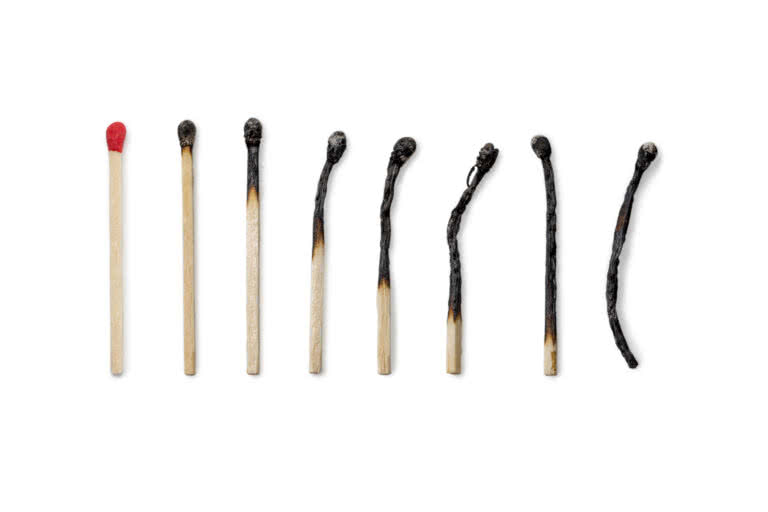With constant deadlines and pressure to deliver, event planning and management has been declared as the fifth most stressful profession of all.
The hours are long and often irregular and sometimes you barely get time to take a break (or eat!). And while you love what you do and simply ‘push through’ on adrenaline and caffeine, does a small part of you wonder if this is sustainable in the long run?
If you’re worried about running out of steam or the damage your hectic work schedule might be doing to your health, here are 6 steps you can take to ease the pressure and avoid burnout as an event manager.
- Start your day with 10 minutes of calm
Author of Burnout to Brilliance Jayne Morris, suggests getting your day off to the right start by beginning with a mediation while you’re still in bed.
“Focus your attention on your breath and take a series of 10 full, deep breaths,” she says. “Purposefully set a positive intention for the day ahead and notice how you feel in your body. Speak kindly and reassuringly to yourself.
“Next, take a shower or listen to some music, drink a cup of tea, play with your children – whatever you do, do it with your mind present on the moment with the intention of setting the scene for the rest of your day.”
Related: How successful event organisers stay clam no matter what
- Eat breakfast before checking emails
Refuelling ahead of a busy day is so important but many of us often end up skipping breakfast. Once we’ve engaged with the workday by checking our phones the sense of urgency to get to work increases and food is no longer a priority.
According to Fawne Hanson, author of the Adrenal Fatigue Solution, this is a big mistake for people at risk of adrenal fatigue (burnout).
“The importance of breakfast for adrenal fatigue sufferers cannot be overstated,” she says. “When we sit down at our breakfast tables we have been fasting for approximately 12 hours. Our bodies need fuel; the right kind of fuel that is going to last us through the morning.
“At breakfast you should be eating a high quality source of protein combined with a small amount of high quality carbohydrates. A vegetable omelette or two poached eggs with blueberries would be two good examples. A healthy breakfast smoothie packed full of healthy fats would be another.”
Hanson adds that eating at regular intervals during the day is vital because cortisol (the stress hormone) is intimately involved with blood sugar stability. Try therefore to keep a packet of nuts, seeds or dried fruit in your pocket so you can easily nibble in between meals.
Related: 8 Morning rituals to keep you fresh and focused throughout your event
- Swap coffee for herbal tea
Most event planners survive on coffee so this one will require a leap of faith, but giving it up could soon help you feel less stressed.
Holistic nutrition coach Nancy Desjardins explains: “Coffee stimulates the adrenal glands, which means that every time you drink coffee, you’re activating the body’s fight-or-flight response.
“But, instead of releasing adrenaline so the body can react to a true stressor, the adrenals are releasing this hormone in response to your coffee consumption. What happens over time is that your adrenal glands start to burn out from overuse, which can lead to adrenal fatigue.”
Desjardins suggests supping on nettle or green tea instead, both of which offer a natural boost with their minerals, nutrients and antioxidants.
Related: 6 Surprising facts about what coffee does to you
- Make appointments with yourself
If you have things you want to get done and don’t want to risk interruptions, schedule appointments in your diary and respect them like important business meetings.
Therapist and health blogger Amy Lewis says: “When someone asks you to work late or add an extra hour, you can say, “I already have an appointment or that time is booked up.” You have to keep those appointments with yourself and cannot cancel!”
Related: 6 Ways to increase your focus (and get more done)
- Exercise, but not too hard
Exercise is great for maintaining a healthy body and mind, but in moderation. People in high stress careers often think they have to put in as much work at the gym as they do at the office and this becomes another stressor.
Dr. James L. Wilson, author of Adrenal Fatigue: The 21st Century Stress Syndrome, says exercise should be enjoyable and not highly competitive, gruelling or debilitating if you’re feeling close to burnout.
“Yoga with breathing exercises, ta’i chi, kick boxing, swimming, fast walking, dancing, and any number of team sports and exercise programs are all good ways to get your body moving. Pick something that is enjoyable to you.
“Remember you are not working out to run a marathon or set new records, but to bring your body back to life and take pleasure in it again.”
Meanwhile, those who don’t feel like exercising at all should persist with gentle activity.
“There will be days that you do not feel like doing anything physical,” he says. “When part of you resists, simply treat that part with kind understanding, acknowledge its resistance, but do not let it undermine your commitment to your health.
“People with adrenal fatigue often feel too tired to exercise. However, if you set a routine time to exercise, no matter how you feel, you will soon experience the rewards of your self-discipline.”
Related: How to exercise in any event situation
- Get quality sleep
Sleep deprivation will sometimes be unavoidable for event professionals, but making the most of the sleep you do get and making bedtime a priority when you can, will go a big way to avoiding burnout.
When Arianna Huffington was establishing The Huffington Post it would not be unusual for her to operate on just a few hour’s sleep per night.
It took for her to collapse and break her collarbone to realise this was endangering her health. The incident not only underlined the importance of sleep it also inspired her book Thrive: The Third Metric to Redefining Success and Creating a Life of Well-Being, Wisdom, and Wonder.
She says: “I went from four to five hours to seven to eight hours. And now, I am pretty religious about it. I also learned that if I am going to keep to this, it means learning that ‘no’ is a complete sentence. And it often means saying no to good things. But I don’t like anymore the feeling of walking through my day like a zombie.”
Huffington also now adheres to a strict ‘device-free’ period prior to bed and in the morning immediately after waking, and suggests you do the same.
“At the end of the day, pick a time when you turn off all of your devices and gently escort them out of your bedroom. It’s terribly important because otherwise, if you have it charging by your bed, and you wake up in the middle of the night for whatever reason, you’re going to be tempted.
“You allow your daytime with its challenges and problems that we all have to deal with to intrude into your recharging night time.”
Related: 10 Scary facts about what sleep deprivation does to you
Conclusion
Too much stress is not only bad for your health it could be a career killer. Take steps to avoid burnout now and enjoy your career in event management and planning for many years to come.





